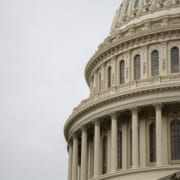On the 21st of August, the House of Representatives introduced a new bill called the Emergency Stopgap USCIS Stabilization Act, which would allow the United States Citizenship and Immigration Services agency to halt the furloughs of over two-thirds of its employees and to expand its services for improved processing of applications.
USCIS is scheduled to furlough 13,355 of its 19,881 employees on August 30th, 2020, if no funding is provided by Congress to support the federal agency. The furloughs, announced in May 2020 when the agency was struggling to combat a funding shortfall, has already been delayed from the end of July. It is important to note that USCIS is now projected to have enough funds to keep its operations fully functional through the remainder of the fiscal year. Despite this, it is likely that the agency will run out of funds after November 2020, so USCIS is still planning to continue with the furloughs.
How the proposed bill works
In order to forestall the furloughs, the Emergency Stopgap USCIS Stabilization Act will increase USCIS’s “premium processing†revenues. Premium processing is a special service offered by the federal agency through Form I-907 to request faster processing of Form I-129, Petition for a Nonimmigrant Worker and Form I-140, Immigrant Petition for Alien Worker. The additional fee for premium processing is currently $1,440, and would expedite the processing to 15 days on eligible petitions and applications.
In order to increase USCIS’s “premium processing†revenues, the premium fee will increase from $1,440 to $2,500 for petitions and applications eligible for premium processing. The sole exception is for H-2B and religious worker (R) petitions, in which case the fee increases to $1,500.
Additionally, the bill expands the availability of premium processing to more petitions and applications. The revenues collected are only allowed to be sued by USCIS to improve adjudication and naturalization services.
Finally, the bill provides benefits to all applicants, either premium and non-premium. The bill will ensure that premium processing funds improve adjudication times and reduce backlogs across all form types, including non-premium applicants. Furthermore, the bill will stabilize the rapidity of premium processing by ensuring that the premium service is only suspended when necessary.
According to Immigration and Citizenship Subcommittee Chairwoman Zoe Lofgren, this bill won’t serve as a complete solution to USCIS’s fiscal struggles, but it will provide USCIS with immediate access to supplemental revenue to eliminate the need for the August 30th furloughs.
Furloughs will dramatically disrupt the process of all U.S. immigration and naturalization services, which is why such a bill – if passed by the Senate – would significantly alleviate a burden on American business and families.




